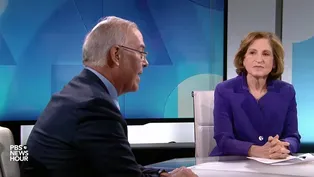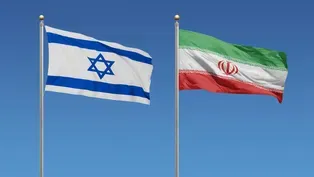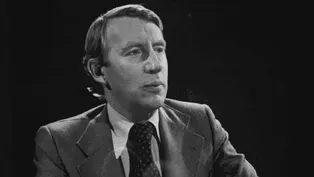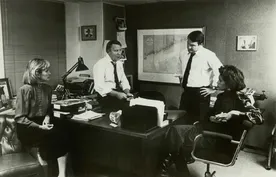
What to expect when Trump's 1st criminal trial begins Monday
Clip: 4/12/2024 | 7m 26sVideo has Closed Captions
What to expect when Trump's 1st criminal trial begins Monday
The nation is about to enter uncharted territory. On Monday, for the first time in American history, a former president will be tried in a court of law. Donald Trump is charged with 34 counts of falsifying business records to prevent news of an alleged extramarital affair from becoming public. William Brangham previews this complicated, historic case.
Problems playing video? | Closed Captioning Feedback
Problems playing video? | Closed Captioning Feedback
Major corporate funding for the PBS News Hour is provided by BDO, BNSF, Consumer Cellular, American Cruise Lines, and Raymond James. Funding for the PBS NewsHour Weekend is provided by...

What to expect when Trump's 1st criminal trial begins Monday
Clip: 4/12/2024 | 7m 26sVideo has Closed Captions
The nation is about to enter uncharted territory. On Monday, for the first time in American history, a former president will be tried in a court of law. Donald Trump is charged with 34 counts of falsifying business records to prevent news of an alleged extramarital affair from becoming public. William Brangham previews this complicated, historic case.
Problems playing video? | Closed Captioning Feedback
How to Watch PBS News Hour
PBS News Hour is available to stream on pbs.org and the free PBS App, available on iPhone, Apple TV, Android TV, Android smartphones, Amazon Fire TV, Amazon Fire Tablet, Roku, Samsung Smart TV, and Vizio.
Providing Support for PBS.org
Learn Moreabout PBS online sponsorshipGEOFF BENNETT: On Monday, for the first time in American history, a former president will be tried in a court of law.
It follows the judge in Donald Trump's New York hush money trial again denying his request for a delay.
Mr. Trump is charged with 34 counts of falsifying business records to prevent news of an alleged extramarital affair from becoming public.
William Brangham has a preview of this complicated and historic case.
DONALD TRUMP, Former President of the United States (R) and Current U.S. Presidential Candidate: We will make America great again.
WILLIAM BRANGHAM: Eight years ago, Donald Trump, the real estate mogul, turned reality TV star, turned presidential candidate, was about to deliver a titanic political upset.
It was the fall of 2016, and despite trailing in the polls to former Secretary of State Hillary Clinton, the Republican nominee was all-confidence.
DONALD TRUMP: When we win on November 8, we are going to Washington, D.C., and we will drain the swamp.
(CHEERING AND APPLAUSE) WILLIAM BRANGHAM: But, a month before Election Day, his campaign was sent reeling when The Washington Post published this more than 10-year-old videotape.
DONALD TRUMP: I just start kissing them.
It's like a magnet.
Just kiss.
I don't even wait.
And when you're a star, they let you do it.
You can do anything.
BILLY BUSH, "Access Hollywood": Whatever you want.
DONALD TRUMP: Grab 'em by the (EXPLETIVE DELETED).
(LAUGHTER) DONALD TRUMP: You can do anything.
STEVE KORNACKI, NBC News National Political Correspondent: The story of the political world has been buzzing about all afternoon, making vulgar comments about women.
WILLIAM BRANGHAM: In full damage control mode, another lurking scandal suddenly seemed more ominous.
For several months, Stephanie Clifford, an adult film actress who goes by the name Stormy Daniels, had been trying unsuccessfully to sell her story of a one-time decade-old sexual liaison with Donald Trump.
But just a few weeks after the "Access Hollywood" tape came out, Trump's lawyer and fixer Michael Cohen used a shell company to pay Stormy Daniels $130,000 of Cohen's own money to stay quiet.
DONALD TRUMP: I, Donald John Trump... WILLIAM BRANGHAM: Then, when Trump became president, he repaid Michael Cohen with a series of checks that were categorized as legal fees.
The details of those transactions, what their purpose was, who knew about them, and how all the checks and invoices and ledgers were recorded, will be at the center of Trump's trial.
ALVIN BRAGG, Manhattan District Attorney: Allegations that someone lied again and again to protect their interests and evade the laws to which we are all held accountable.
WILLIAM BRANGHAM: Manhattan district attorney Alvin Bragg, a Democrat, has charged Donald Trump with 34 counts of fabricating financial records to conceal -- quote -- "damaging information from the voting public during the 2016 presidential election."
JERRY GOLDFEDER, Senior Counsel, Cozen O'Connor: Unfortunately, the way the media has presented it is, it's a hush money case, but that's not really what it is.
It's about falsifying business records.
WILLIAM BRANGHAM: Jerry Goldfeder is a senior partner at Cozen O'Connor and an expert in campaign law.
JERRY GOLDFEDER: Doing that, that is a crime, but it's only a misdemeanor.
It's a felony when falsifying business records is done for the purpose of concealing or committing another crime.
And that's what district attorney Alvin Bragg has charged, that Trump falsified all these business records because what he really wanted to do was to hide these facts to win the election.
WILLIAM BRANGHAM: And so even though he's not being charged for that subsequent, that secondary crime, that's all it takes to move it from a misdemeanor to a felony?
JERRY GOLDFEDER: That's exactly right.
WILLIAM BRANGHAM: While Bragg's indictment is full of examples of allegedly false retainer agreements and invoices and legal expenses, Bragg clearly wants this case seen as an attempt to subvert an election.
But the law on that is complicated.
RICK HASEN, UCLA School of Law: If in fact these payments to Daniels were in fact campaign-related and they weren't disclosed willfully, that could be a crime.
WILLIAM BRANGHAM: Rick Hasen is an election law scholar at UCLA Law School.
RICK HASEN: One big question here is whether these payments are campaign-related, as opposed to related to, say, Trump's personal life.
So, for example, if these payments were made solely so that he wouldn't face embarrassment with his family, then that wouldn't be campaign-related, just like if a candidate made a payment and bought a boat during the campaign, unrelated, that would you wouldn't have to disclose that.
WILLIAM BRANGHAM: Can those be one and the same?
Could Trump have been trying to stop him -- his wife getting upset about an alleged affair, and could it also be a campaign violation because he was trying to stop voters from finding out?
RICK HASEN: Sure.
And I think that the question would be a kind of a causation question.
Would he still have made these payments if he were not a candidate?
I think that's what we'd be asking.
WILLIAM BRANGHAM: Hasen points to the similar case of Democrat John Edwards, who was indicted for soliciting money to pay his mistress, Rielle Hunter, who had a child with him while he was running for president in 2008.
In court, Edwards argued the money was gifts from friends, not campaign donations, because they were meant to hide the affair from his cancer-stricken wife, Elizabeth, not from voters.
RICK HASEN: He was acquitted by a jury, with the finding that this was mostly about John Edwards' personal life, as opposed to being primarily campaign-related.
These can be tricky questions.
WILLIAM BRANGHAM: Another complication in this case is that the prosecution's key witness, the one who will testify about the origin of those payments, how they were accounted for, and who knew what, is Michael Cohen.
JESSICA ROTH, Yeshiva University Cardozo School of Law: Michael Cohen is a very problematic witness for the prosecution in this case.
WILLIAM BRANGHAM: Jessica Roth teaches law at Cardozo Law School in New York City, with expertise in white-collar crime.
JESSICA ROTH: First, he has pled guilty to crimes that involve deception and deceit, including tax fraud, bank fraud, and lying to Congress.
And those crimes go to his truthfulness as a witness.
Secondly, he's been inconsistent in terms of what he has said about Trump's involvement in this scheme.
He previously, before he decided to turn against the former president, said that Trump was uninvolved in the payments to Stormy Daniels.
And then, finally, he is a biased witness in the sense that it's quite clear and he's been quite explicit about the fact that he harbors significant animosity toward the former president.
They were once close.
They are no longer.
And so, the defense, I think, will be able to point to that bias and suggest to the jury that that it is coloring Cohen's testimony.
WILLIAM BRANGHAM: Jury selection starts Monday.
Potential jurors will be questioned about their political allegiances, knowledge of the case, and whether they're able to render fair judgment in this historic, first-of-its-kind trial.
For the "PBS NewsHour," I'm William Brangham.
Brooks and Marcus on abortion restrictions motivating voters
Video has Closed Captions
Clip: 4/12/2024 | 10m 40s | Brooks and Marcus on how abortion restrictions could motivate voters in November (10m 40s)
Israel awaits possible retaliatory attack from Iran
Video has Closed Captions
Clip: 4/12/2024 | 4m 43s | Israel awaits possible retaliatory attack from Iran and proxy forces (4m 43s)
Renowned journalist, NewsHour co-founder Robert MacNeil dies
Video has Closed Captions
Clip: 4/12/2024 | 13m 2s | Renowned journalist and NewsHour co-founder Robert MacNeil dies at 93 (13m 2s)
Robert MacNeil's colleagues remember his life and legacy
Video has Closed Captions
Clip: 4/12/2024 | 9m 6s | Robert MacNeil's colleagues and friends remember his life and legacy (9m 6s)
Providing Support for PBS.org
Learn Moreabout PBS online sponsorshipSupport for PBS provided by:
Major corporate funding for the PBS News Hour is provided by BDO, BNSF, Consumer Cellular, American Cruise Lines, and Raymond James. Funding for the PBS NewsHour Weekend is provided by...















